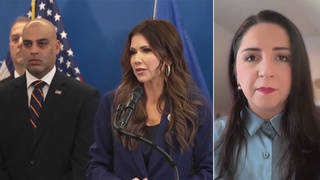
President Trump is promoting unproven claims that both vaccines and the common painkiller acetaminophen, also known as paracetamol or by the brand name Tylenol, cause autism. Trump’s recent anti-vaccine and anti-autism stances have been influenced by his Health and Human Services Secretary Robert F. Kennedy Jr., a longtime anti-vaccine activist who unsuccessfully ran for president himself before throwing his support behind Trump’s reelection campaign. “The way they talk about autism, in this such sort of baby terms, in this very simplistic idea that we’re going to find the cause of autism or the cure for autism, it rings hollow … because we know it’s a complex interplay between oncogenes and the environment,” says Dr. Peter Hotez, a vaccine expert and the parent of a child with autism, who notes that increased autism rates are also a consequence of improved diagnostic practices. He discusses the current state of autism research and the Trump administration’s larger attacks on mainstream science.
Transcript
AMY GOODMAN: This is Democracy Now!, democracynow.org, The War and Peace Report. I’m Amy Goodman, with Juan González.
We turn now to the subject of autism and false claims about the causes of autism made by President Trump and Health and Human Services Secretary Robert F. Kennedy Jr. at a news conference at the White House on Monday. President Trump, without evidence, linked autism to vaccines and said the combination MMR vaccine should be broken up into separate shots for measles, mumps and rubella — but he couldn’t remember the word “rubella.”
Trump also recommended removing aluminum from vaccines and said parents should wait until their children are 12 to vaccinate against hepatitis B, falsely stating it’s only transmitted sexually, which isn’t true, so saying infants shouldn’t have the hep B shot, they should wait, when, in fact, it is transmitted through breast milk, in utero and in the home.
Trump also promoted the unproven claims that the common painkiller acetaminophen, brand name Tylenol, causes autism in children if taken during pregnancy.
PRESIDENT DONALD TRUMP: First, effective immediately, the FDA will be notifying physicians that the use of aceta — well, let’s see how we say that, acetaminophen, acetaminophen — is that OK? — which is basically commonly known as Tylenol, during pregnancy can be associated with a very increased risk of autism. So, taking Tylenol is not good. I’ll say it: It’s not good.
AMY GOODMAN: The American College of Obstetricians and Gynecologists called President Trump’s remarks about Tylenol “irresponsible,” adding, “It is highly unsettling that our federal health agencies are willing to make an announcement that will affect the health and well-being of millions of people without the backing of reliable data.”
Dr. Helen Tager-Flusberg, founder of the Coalition of Autism Scientists, said, quote, “When the president of the United States makes claims like this we know that many parents will be listening, and the impact may be truly devastating,” unquote.
For more, we’re joined by Dr. Peter Hotez, dean of the National School of Tropical Medicine at Baylor College of Medicine in Texas, where he’s also co-director of the Texas Children’s Center for Vaccine Development. He’s the author of several books, including Vaccines Did Not Cause Rachel’s Autism: My Journey as a Vaccine Scientist, Pediatrician, and Autism Dad and his new book, co-authored with Dr. Michael Mann, Science Under Siege: How to Fight the Five Most Powerful Forces That Threaten Our World.
Dr. Hotez, welcome back to Democracy Now! I want to reiterate that point, that you are the father of an autistic daughter, as well as a scientist. If you can talk about this moment, with President Trump stating one unproven fact after another, and talk about Tylenol, what we know and what we don’t know?
DR. PETER HOTEZ: Yeah, yeah, Amy, it was 15, 20 minutes of a complete fact-free news conference.
I think, you know, the best way to approach this is to go back to first principles and understand what is autism and how does it come about. We’ve learned so much about autism, and I wrote about it in the book, which, by the way, came out — I wrote that book, Vaccines Did Not Cause Rachel’s Autism, after a year of conversations with Mr. Kennedy. That was the product of that. And then I followed up — we followed up this in the brand-new book, Science Under Siege, with Michael Mann. But we know a lot about autism now.
Autism occurs through the action of more than 100 different autism genes, so that’s why we call it an autism spectrum, not just autism, because it’s a hundred — really, a hundred different conditions of varying degrees of neurologic activity. All of these genes are involved in early fetal brain development. So, we can explain the vast amount of autism just simply through the understanding of the genetics and understanding how these genes operate. Now, it doesn’t mean that there is no environmental exposures or triggers, but it’s operating through influencing autism genes early on in fetal brain development.
The best example we know of a teratogen that — or, something that will affect autism genes that will give an autism phenotype, is a medication called Depakote, otherwise known as valproic acid, which they didn’t talk about at all. So, if you’re pregnant and not aware of it and on that anti-seizure medication called valproic acid, valproate or Depakote, it’ll interact with autism genes and give you an — more likely than not, could give you an autism phenotype. That looks pretty strong.
And there are about half a dozen other chemical exposures that may do the same thing, when — and certainly not vaccines, because, again, these are all events happening in early fetal brain development. So, it’s not just the massive evidence showing there’s no link between MMR or thimerosal or alum or all the other things they say in autism, because it’s happening in pregnancy, so there’s no plausibility.
But then, let’s get to Tylenol. Now, you know, of the half a dozen chemical exposures that look pretty strongly linked to autism and interacting with autism genes, Tylenol right now is not really on that list, because about a year ago, we had — there was a very large study done out of the Karolinska Institute in Sweden, and this is one of the top research institutes and universities in Europe, and it showed pretty clearly, among those 2 million people enrolled in the study, that there was no link between Tylenol and autism. There was a follow-up study of what’s called a meta-analysis, or a systematic review, where the study found some studies could show a link, others don’t — certainly worth following up on, not as high a priority, from my point of view, as the others, higher-priority ones, on the list.
And if they held a news conference to say, “Look, we are interested in autism. We do think this is important for the health of the American people. We’re going to convene the experts. We’re going to convene some of the best neuroscientists, genetics experts, environmental health scientists, and bring them together to really pin down that complex interplay between autism genes and the handful of environmental exposures we know about. Further down the list, we may also look at Tylenol,” fair enough. I think nobody would argue with that. But instead, what we got was — and I called it “fact-free” — this specific laser focus on Tylenol, which doesn’t make sense.
And then, the last thing I’ll say is, again, the way they talk about autism in this such sort of baby terms, in this very simplistic idea that we’re going to find the cause of autism or the cure for autism, it rings hollow, because we know this complex interplay between autism genes, maybe some environmental exposures early on in pregnancy. It’s like talking about any other complex condition. We wouldn’t say, you know, for instance, “We’re going to find the cause of cancer, the cure of cancer.” Nobody would accept that, because we know it’s a complex interplay between oncogenes and the environment. So, it was certainly an exercise in frustration for those of us in the scientific community.
JUAN GONZÁLEZ: Dr. Hotez, I wanted to ask you: How much of the rising rates in autism are the result of increased testing or recognition of the condition? And how much, do you feel, are real?
DR. PETER HOTEZ: So, that’s a really important question, and it’s a fair question to look at in more detail. Clearly, we’ve shifted how we diagnose autism. We used to call it autism; now we call it autism spectrum disorder. And you have this whole very interesting discussion about neurodiversity that brings in a lot of bioethics issues.
So, starting in around the early 2000s, the American Academy of Pediatrics started asking pediatricians and recommended pediatricians do autism screening between the first and second year of life. And guess what: The numbers went up. We also got better at diagnosing autism in girls and women. We used to say it was 10 to one, boys to girls. Now the proportion is roughly three to one. But as we get better in diagnosing autism in girls and women, because girls and women tend to camouflage for autism better — we often diagnose — there are comorbidities, such as OCD, obsessive compulsive disorder, or some of the eating disorders — it may even get closer to parity. We’ve also reached underserved schools in a better way. So we’re diagnosing autism in the underrepresented minority community better. So, all of that feeds into the likely explanation accounting for the steep rise in autism cases.
Now, I do think there is an environmental component. And I remember having that conversation with Mr. Kennedy years ago. I’d say, “Look, Bobby, I can identify half a dozen chemical exposures, like valproate. You’re an environmental attorney. This is your sweet spot, man. You should be all over this and really look into it.” At the time, he had no — zero interest. Now, you know, he comes along, you know, years later and talks about Tylenol, which, again, you know, is not what the science is telling us. So, I do think there could be an environmental component to that, as well. It should be looked into, but certainly not with the kind of rhetoric and the approach that this administration is proposing to take.
AMY GOODMAN: Let’s go to Health Secretary Robert F. Kennedy Jr. recommending the use of leucovorin, claiming it improves verbal communication when given to children on the spectrum.
HHS SECRETARY ROBERT F. KENNEDY JR.: We have also identified an exciting therapy that may benefit large numbers of children who suffer from autism. Peer-reviewed literature has documented that up to 60% of folate-deficient children with ASD can have improved verbal communications if given leucovorin. I have instructed NIH, FDA and CMS to help doctors treat children appropriately. Jay will help tell that story, which started with sound science, the kind that restores faith in government.
AMY GOODMAN: So, that’s Robert F. Kennedy Jr., a man you know well. You spent a year talking to him. Your book about your daughter, on the spectrum, Rachel, also comes out of that. Explain what this is and what he’s saying. And what does anecdotal versus evidence-based medicine mean?
DR. PETER HOTEZ: So, again, this is getting back to that first principle and why we started out this way. You know, a hundred different autism genes. There are many different phenotypes. There are various subsets of kids and adults on the autism spectrum who have what are called autoantibodies to different components of their body, that some have antibodies to what are called glycosphingolipids, which is a type of a glycolipid. Others have autoantibodies to different membrane proteins. Some have what are called ANA antibodies, which you can — anti-nuclear antibodies, that you can find in lupus. And there is a subset that seems to have antibodies against a folate receptor, which is a metabolite used for the synthesis of purines and pyrimidines in DNA. And perhaps for that subset of kids and adults, there could be some benefit for giving — from giving leucovorin. And there are even some studies to support that.
And that’s the way it needs to be framed. But again, it’s always spoken about in these baby terms, right? “Tylenol is the cause of autism.” It’s ridiculous. Or now leucovorin is going to come to — come to be used as a major treatment. Again, what we need is better understanding, better, you know, precision medicine to really focus on the subgroup of kids and adults who may benefit from leucovorin.
JUAN GONZÁLEZ: And, Dr. Hotez, in a broader sense, this war on science that the Trump administration has unleashed, all the cutbacks in research and the reductions of university research capacities, the doctors, many researchers fleeing to Canada or to Europe or Asia to be able to continue to conduct their research — what’s the impact on the United States of this war?
DR. PETER HOTEZ: Well, first of all, let’s look at why this is happening. You know, Mr. Kennedy and this new version of Health and Human Services is very tied in with the wellness and influencer industry, in which, you know, a lot of it is built up on whatever they can buy in bulk and jack up the price and then sell with $1,600 telehealth visits. I mean, if you ever wondered why they’re all anti-parasitic drugs — ivermectin, hydroxychloroquine, fenbendazole, as we report in the book — it’s because they’re cheap, available in bulk. You can jack up the price and sell it with a $1,600 telehealth visit.
But it also involves attacking mainstream science. That’s why, you know, they attack vaccines. And that’s why you heard Mr. Kennedy, during our terrible measles epidemic that began in West Texas — you know, he says, “Well, yes, you can get the measles-mumps-rubella vaccine, or you can get this cocktail of supplements — budesonide and vitamin A and clarithromycin.” You’re scratching your head and saying, “Where the heck does that come from?” This is — that’s his pivot to the health and wellness and influencer industry. But part of that, tragically, is for them — for the health and wellness influencer industry to sell their snake oil, they have to attack mainstream science. And the scientists then portray people like myself as cartoon villains or public enemies, and that means attacking the academic health centers. And they falsely allege that they’re tied up with pharma companies and that sort of thing. And that’s where the NIH funding cuts come. It’s all to benefit — that’s what the MAHA movement is. It’s basically an economic stimulus plan for the health and wellness and influencer industry. And it’s very damaging.
And it’s particularly tough for our young scientists who are just starting out. You know, sometimes I feel like they look at me in the desert — look at me like Moses in the desert. You know, “Why did you bring us here?” And you have to, you know, find — carve paths of light to carve through this, because it has made things very complicated. I still think you can — as we talk about in the book, Science Under Siege, you know, where there’s urgency, but there’s also agency. I do think we can find a path of light through this darkness. But it’s certainly gotten more complicated.
AMY GOODMAN: We just have 30 seconds, Dr. Hotez, but I wanted to go back to this point where Trump says to pregnant people, “Just tough it out if your temperature spikes.” What is the absolutely damaging message here, when people who are pregnant are told that if their temperature spikes — this can damage the fetus — tough it out, don’t take Tylenol?
DR. PETER HOTEZ: Yeah, that’s right. I mean, I’m not an obstetrician, but talking to my obstetrics colleagues, you know, one of the things that they’re aware of is that, just like certain harmful drugs, such as Depakote, has a harmful effect on the fetus, fever itself, or some of the viruses that can cause the fever, can have a harmful effect on the fetus. And so, there may be a real downside from not taking Tylenol, because we don’t have a lot of options for pregnant women. You know, the obstetricians tend to avoid using aspirin or ibuprofen, so there’s not a lot of choice out there. So, to come out and just push Tylenol, when the evidence for it is not there, is completely reckless, on my part, and I don’t understand why the administration chose to do that.
AMY GOODMAN: Dr. Peter Hotez, we want to thank you for being with us, dean of the National School of Tropical Medicine and professor at Baylor College of Medicine. Among his books, his latest book is called Science Under Siege: How to Fight the Five Most Powerful Forces That Threaten Our World.
Coming up, President Trump signs an executive order calling antifa a terrorist organization. Stay with us.
[break]
AMY GOODMAN: “Let Freedom Ring,” performed by Tom Morello for Democracy Now!’s 25th anniversary. It was during the pandemic, and so he performed on Zoom.













Media Options